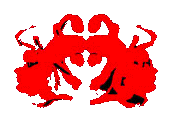|
Consider Gender
Ψ Gender: The characteristics, whether biologically or socially influenced, by which people define male & female.
Ψ "Of the 46 chromosomes in the human genome, 45 are unisex." So males are quite similar to females; however, its the differences that make the difference.
Consider Gender Differences
Ψ Independence versus connectedness
• Women have more empathy than men
• Women, more than men, give priority to close, intimate relationships
Ψ Social dominance: Men are socially dominant everywhere.
Ψ Aggression
• Men are more likely to inflict an injury
• Women are slightly more likely to commit an aggressive act
Ψ Sexuality
• There is a gender gap in sexual attitudes & assertiveness
• The difference in sexual attitudes carries over to sexual behavior. Cross-culturally
"males are more likely than
females to initiate sexual activity", Segall et. al. (1990)
Evolution & Gender
Gender & Mating Preferences
• Women seek to reproduce wisely, men widely.
• Nature selects traits that help send one's
genes into the future.
• Men will strive to offer what women will desire: external resources &
physical protection.
• There are gender preference similarities, both men & women desire kindness,
love, & mutual attraction.
Gender & Hormones
Ψ It seems that sex hormones, mainly testosterone, are a key element in gender differences. Testosterone both influences masculine features & aggressiveness. Violent male criminals generally have much higher testosterone levels. Most males seem to become much less aggressive as they grow older & testosterone levels drop.
Reflections on Evolutionary Psychology
Ψ There are two problems with Evolutionary Psychology: hindsight bias & cultural socialization.
• Hindsight bias is an attempt to explain behavior by examining history & working backward to find an explanation for this behavior, e.g., if we were to say women are stronger & aggressive than in hindsight we can say that this is because women needed to be this way in order to protect their young (Myers, 2004).
• Evolution cannot on its own predict cultural variations in behavior through time even though cultural socialization tests evolutionary predictions through the utilization of cross-cultural & animal behavior observations, as well as hormonal & genetic studies.
Culture & Gender
Ψ Culture can be defined as the ideas, behaviors, attitudes & traditions that have been passed within a group through generations. Within a culture there are certain behavioral expectations.
Ψ Gender Role: A set of behavioral expectations (norms) for males or females.
Ψ The variety of gender roles across cultures & over time shows that culture indeed constructs our gender roles.
Gender Roles Vary with Culture & Time
Ψ Gender roles have gone through dramatic times in the last part of the century, e.g. in 1938 only 1 out of 5 Americans agreed that a married woman could earn money in the industry & business fields. However, in 1996 a remarkable 4 out of 5 Americans approved of women working in these fields proving that time has greatly influenced changes in American culture. Today, we more or less expect women to work outside the home. It is evident that the culture has shifted.
Conclusions: Biology & Culture - Nature & Nurture
Ψ Biology & culture both play a role in how are attitudes & behaviors are affected. Genetics may predispose us to behave a certain way, but culture may accentuate these behaviors. There is an interaction between biological & cultural (nature & nurture) influences in that the effects of biology are dependent on the environment.
Social Psychology
Robert C. Gates
|

|
|










